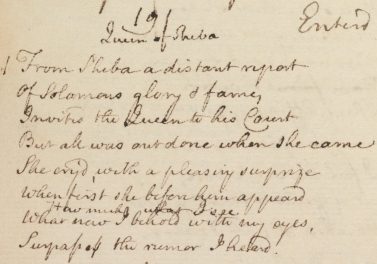|
Olney Hymns Book 1 Hymn 34
From Sheba a distant report...
Manuscript Hymn No. 191

1 Kings
Chapter 10:1-9
Queen of Sheba
From Sheba a distant report
Of Solomon’s glory and fame,
Invited the queen to his court,
But all was outdone when she came;
She cried, with a pleasing surprise,
When first she before him appeared,
“How much, what I see with my eyes,
Surpasses the rumour I heard!”
When once to Jerusalem come,
The treasure and train she had brought,
The wealth she possessed at home,
No longer had place in her thought:
His house, his attendants, his throne,
All struck her with wonder and awe;
The glory of Solomon shone
In every object she saw.
But Solomon most she admired,
Whose spirit conducted the whole;
His wisdom which God had inspired,
His bounty and greatness of soul;
Of all the hard questions she put,
A ready solution he showed;
Exceeded her with and her suit,
And more than she asked him bestowed.
Thus I, when the gospel proclaimed
The Saviour’s great name in my ears,
The wisdom for which he is famed,
The love which to sinners he bears;
I longed, and I was not denied,
That I in his presence might bow;
I saw, and transported I cried,
“A greater than Solomon Thou!”
My conscience no comfort could find,
By doubt and hard questions opposed;
But he restored peace to my mind,
And answered each doubt I proposed:
Beholding me poor and distressed,
His bounty supplied all my wants;
My prayer could have never expressed
So much as this Solomon grants.
I heard, and was slow to believe,
But now with my eyes I behold
Much more than my heart could conceive,
Or language could ever have told:
How happy thy servants must be,
Who always before thee appear!
Vouchsafe, Lord, this blessing to me,
I find it is good to be here.
 |
|
from John Newton's Diary, relevant to this hymn:
Sunday 8 June 1755
Rose at 4. After private prayer etc went to the Tabernacle; was admitted upon producing the ticket - and here indeed I had a blessing. There were about 1,000 or more people of different persuasions, but all agreed in the great essentials of the Gospel, and in mutual charity, worshipping the Lord with one heart and soul. Never before had I such an idea and foretaste of the business of heaven. Mr Whitefield made use of the office of the Church of England , interspersing exhortations, encouragements etc occasionally all along; and it seemed as though that composure, that elevation and assurance of faith which shone in his frame and discourses was in some measure diffused over the whole assembly. He made many little intervals for singing hymns – I believe near twenty times in all. I hope I shall have lasting reason to bless God for favouring me with such an opportunity.
Thursday 12 June 1755
My principal business to town this time, was to see and hear Mr Whitefield, that I might judge and speak of him from my own knowledge. From what I have seen in different places of the great work of revival, which God has owned under his hand, as well as from the character given of him by several on whose judgment I could well depend, I have long entertained a respect for him, and have prayed for a blessing on his endeavours for God’s glory. But now I must say Behold the half was not told me. [1 Kings 10:7]
Saturday 21 January 1775
Retired this evening to seek a blessing for tomorrow. Am reading Woolaston’s Religion of Nature, that Idol book of the men of reason – Lord make me thankful for a better light. How does the knowledge of the Gospel show the vanity of every other scheme.
Sunday 22 January 1775
Hymn: Queen of Sheba
Proverbs 24:9
Isaiah 53:7
Hymn No. 191
[On this date Newton preached from the above texts at his church, St Peter & St Paul, Olney, during the morning and afternoon services, and from this hymn at the informal evening service]
[Wollaston considered religion and morality to be identical, asserting religion to be "the pursuit of happiness by the practice of truth and reason".] |
|
|
Image copyright:
Hymn: MS Eng 1317, Houghton Library, Harvard University
Diary: John Newton Collection, CO199, Princeton University
|
Marylynn Rouse, 10/09/2013
|
|
|
|